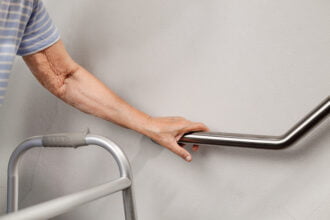Healthcare providers face serious risks of injuries, be it needles, back injuries, blood-borne diseases, stress, or latex allergies. These risks aren’t limited to doctors and nurses, as other healthcare employees, including home health workers, nursing aides, orderlies, and attendants, suffer in equal measure.
The preceding pandemic highlighted the important role of healthcare workers in saving lives and relieving patient suffering. However, health workers can’t provide these services if they are exposed. While eliminating all risks of working in a healthcare environment is impossible, below are a few tips that can improve health worker safety.
1. Provide PPEs and vaccines
The first line of protecting healthcare workers is equipping them with quality PPEs and vaccines. Surprisingly, a spot check on a few hospitals in Africa and Asia found that 45% of health facilities have basic protective equipment, which includes masks, disinfectants, gloves, and sanitizers. This is certainly unacceptable, given the endless availability of quality and affordable gloves from different manufacturers, including Nitrile gloves.
Healthcare workers should also be prioritized for vaccinations against common infectious diseases. This became apparent in the recent pandemic, which affected a significant percentage of health workers and their immediate families. Thousands of health workers worldwide lost their lives during the pandemic.
2. Provide continuous staff training
Continuous staff training also contributes to improving the safety of healthcare service providers. Most healthcare organizations offer basic training, such as proper use of PPEs and sharps safety. However, it is uncommon for most healthcare facilities to train their staff on modern issues faced by healthcare workers in their workplace, specifically mental health and de-escalation.
Healthcare workers, especially facility managers, should also be trained in proper conflict resolution to promote employee safety. Mental health training allows employees to understand their health needs, manage stress, and other workplace-related mental issues.
3. Implementing stringent security measures
Wide-reaching security measures also contribute to health workers’ safety. Security measures in workplace environments include enforcing a zero-tolerance policy towards abuse, analyzing safety incidents, installing physical barriers, and employing security personnel. Healthcare facilities should also revisit hardware and software security provisions, such as educating staff on using panic buttons and walkie-talkies. Most healthcare facilities often ignore these simple yet crucial security measures.
4. Communicate clearly
Healthcare facilities should also communicate intentionally with their staff about their safety and encourage them to report safety incidents that occur in their work environment. It is crucial for healthcare organizations to inform patients of actions that constitute inappropriate behavior and associated consequences. This might mean installing physical signage with a word of caution.
5. Train employees on fire and chemical hazard safety
Healthcare workers should also be trained on fire and chemical hazard safety measures. Healthcare facilities rely on several gasses and materials, such as hydrogen, methane, antiseptic agents, and oxygen, which pose a fire risk. Similarly, several chemicals used in the healthcare industry, such as bisphenol A and mercury, can harm health workers. Medical facilities should train their employees in various safety measures as per OSHA guidelines.
Endnote
While healthcare workers are certainly at risk of workplace illnesses and injuries, several measures can mitigate or minimize exposure. Providing personal protective equipment, conducting regular staff training, and introducing protective safety measures can keep health workers safe at work. Health workers should also observe proper medical waste management practices.









